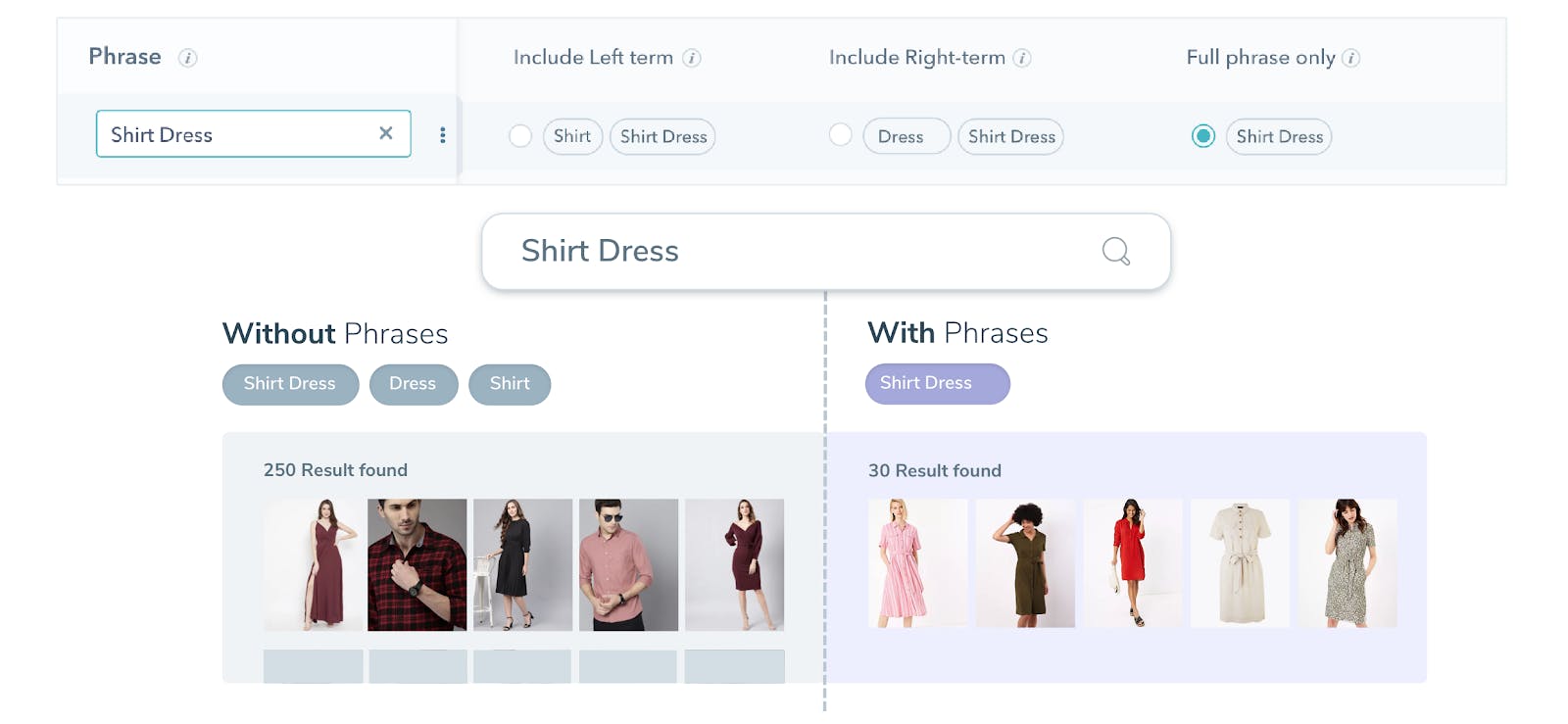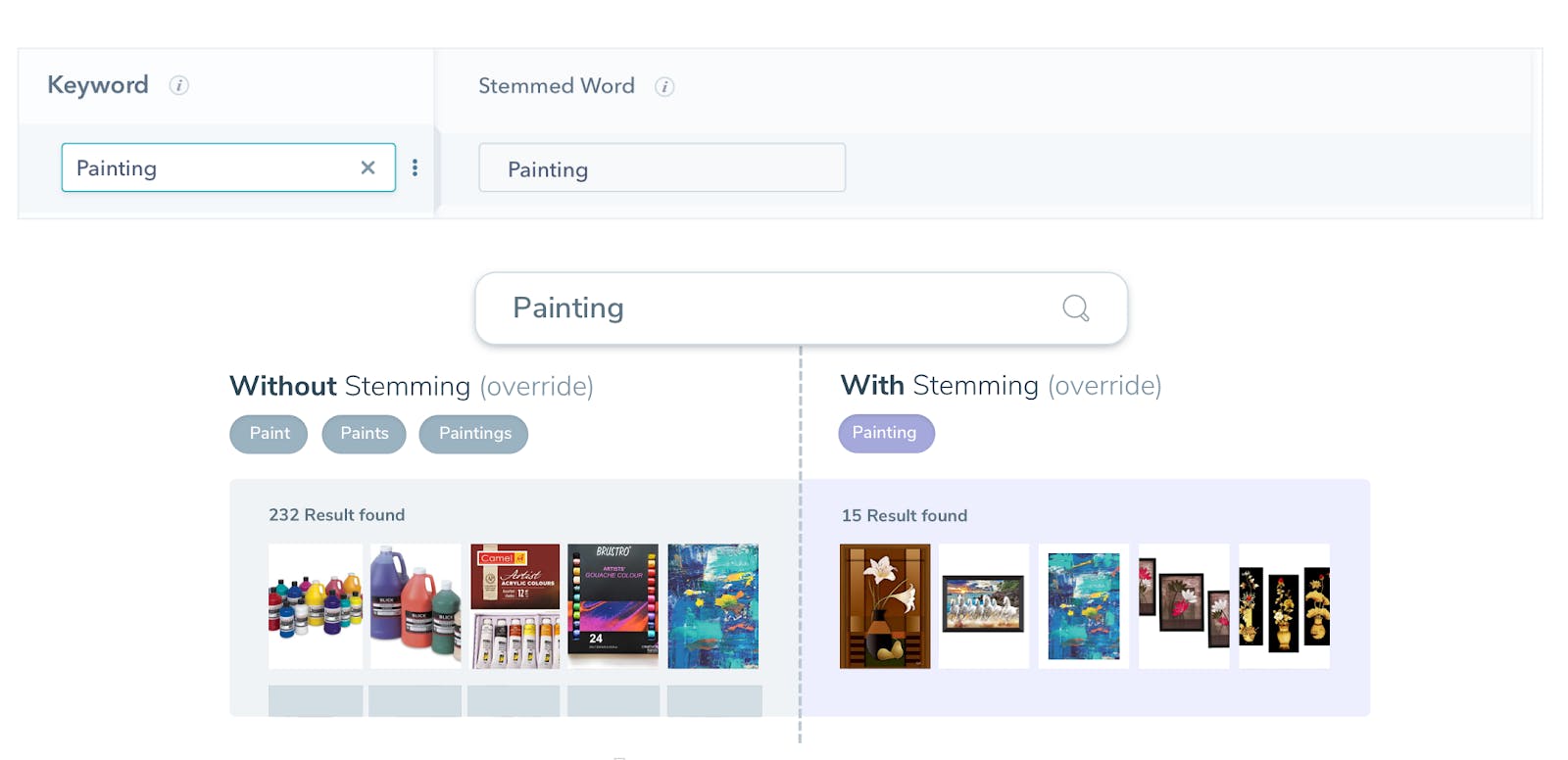What to expect?
The current product and its upcoming releases would allow merchandisers to define different assets/dictionaries to control the interpretation of a search query. Although, our data science team has developed in-house algorithms that use the shopper's behavior data to constantly improve the performance of the search queries and automatically generate these assets/dictionaries. These algorithms require massive amounts of data to work effectively and generate results with high accuracy. While we are working towards improving the algorithms, there was a need to expose controls that allowed merchandisers to fix the issues identified by them. The feature would be handy for small retailers with low traffic to automatically leverage AI algorithms mining these assets. The merchandisers would be able to define the following assets/dictionaries :
Concepts
"Concepts" represents the terms in the search query considered extremely important by the shoppers. Hence, the products in search results must include the concepts in the search query. Therefore, concepts can be regarded as a precision instrument that informs the search engine to give higher importance to precision over recall (i.e., the number of products in search results).
Let's take an example to look at how concepts help improve search precision. Let's say a shopper who uses an Xbox console visits an online game retailer to search for "Lego Batman Game for Xbox." If the retailer doesn't have the Lego Batman games in stock, they may show other Lego games in response to the query to ensure that the customer finds related Lego games in the store. However, while performing this expansion, the retailer must be mindful that they are not showing PS4 Lego games to a customer searching for Xbox games. In such a situation, the retailer can define "Xbox" as a concept to ensure that customers searching for Xbox games only see Xbox games in the result set.
When to define concepts ?
A merchandiser can use their understanding of shoppers to define concepts effectively. For example, if the shoppers of a fashion retailer are highly brand conscious the merchandiser can include all the brands in the catalog as ideas. This would ensure that when a shopper searches for a specific brand, they only see the products from that brand.
Tip: Defining all the independent product types in the catalog as Concepts has generally worked well for most of our customers in the past.
Phrases

As Wikipedia defines, “A phrase is any group of words, often carrying a special idiomatic meaning.” Phrases allow merchandisers to limit multi-word terms as phrases treated as a single entity by the search tokenizers.
Let’s take the case of a fashion retailer to check how phrases help improve relevance. Let’s say the fashion retailer carries a “Shirt Dress.” When a shopper searches for a “Shirt Dress,” they are interested in the shirt dress for women and would not want to see Shirts or other types of dresses in response to the query. Phrases allow merchandisers to define multi-term phrases specific to their business use cases.
Stemming (Overrides)

Stemming is the process of reducing a term to its root form. Stemming allows a search engine to algorithmically handle similar terms without explicitly defining synonyms. Although stemming is helpful in most cases, there are situations where stemming terms to their root forms may not be ideal for the business. For example, “painting” is derived from the word “paint,” and the stemming algorithm would reduce the term “painting” to paint. This might be the expected behavior for a hardware retailer; however, it won’t be ideal for an Arts retailer selling decorative pieces (including paintings). Stemming allows merchandisers to define the stemmed form of the term to override algorithmic stemming for specific terms.
Stopwords
Stop words are a pool of terms that help understand the relationship between the terms in search queries but do not add any value while determining the rank of products in response to a question (Ex. at, to, and, for, etc.). The stopwords section (in Unbxd Console) allows retailers to specify their business use-case-specific stopwords.
How does it help Merchandisers ?
Merchandisers could define merchandising campaigns to fix relevance for queries misinterpreted by the search engine. However, the approach was not ideal because :
- Merchandisers can only do it for the head queries which receive significant volumes. The approach was not scalable for long-tailed searches.
- Merchandising options such as landing pages and redirects override the default search behavior and won't be able to learn and improve from the shopper's behavior on the website.
To overcome these challenges, we decided to give more control to the merchandisers so that they can control how the search engine interprets a search query. The new controls enable the merchandisers to override the search engines'' default behavior for handling business-specific use cases effectively. While our data science team is developing algorithms to solve the problem at scale with limited training data, these controls would go a long way in addressing some of the critical challenges merchandisers face.
In the last year, we have invested heavily in democratizing search controls and enabling our customers to take complete control over their website search powered by Unbxd. Our product is steered in the same direction, simplifying merchandising rules further for ecommerce businesses of all sizes. We have a lot of exciting updates planned in the upcoming months, so stay tuned to receive updates. To get a free demo, contact us.








